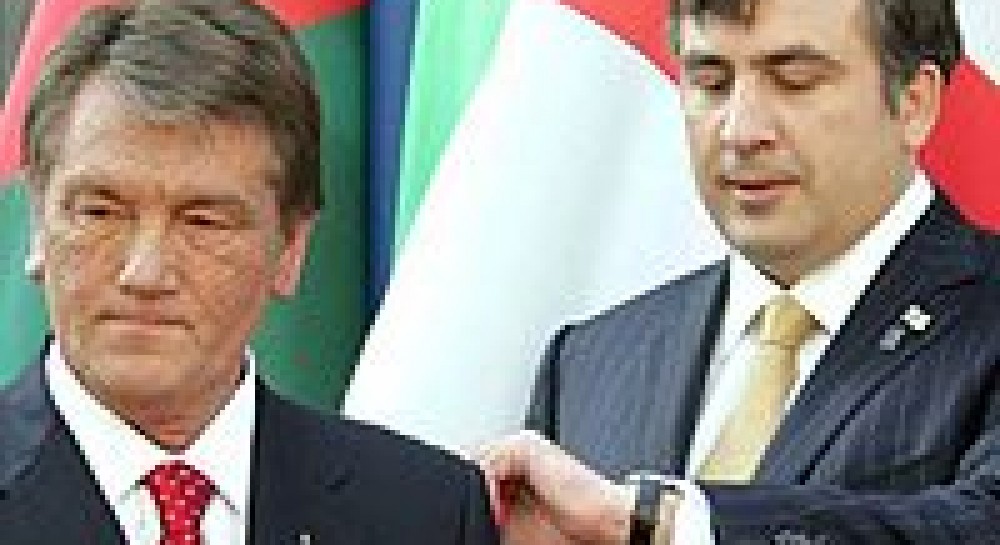
Where Europe draws the line
Georgia`s was the first of the "color revolutions"; the second was in Ukraine, which in 2004 shook off an attempt by Vladimir Putin to install a satellite autocracy... "By refusing us, [NATO] will be sending a signal to Russia of, `Go and get them," - Saakashvili...
Mikheil Saakashvili kicked off the second wave of freedom movements in formerly Communist Europe in 2003 when he strode into the Georgian Parliament, rose in hand. Now he`s president, and his country and his revolution are in danger of being stranded between a weakening West and a surging Russia. Last week he came to Washington in the somewhat desperate hope that President Bush would spend some of his last diplomatic capital to defend the two European democracies born on his watch.
Georgia`s was the first of the "color revolutions"; the second was in Ukraine, which in 2004 shook off an attempt by Vladimir Putin to install a satellite autocracy. Now, like the first wave of post-Communist democracies in Central Europe, Georgia and Ukraine are trying to consolidate their liberal regimes, and their independence, by joining NATO. Both have formally asked NATO to choose them for a "membership action plan" at a summit two weeks from now in Bucharest. That would inaugurate a process of monitored reforms that could lead to full membership in a few years.
It`s a logical step that already has allowed 10 European countries, from Poland to Romania, to adopt the institutions and receive the protection of the democratic West -- arguably the greatest achievement in NATO`s history. But the alliance and its leaders are weaker than they were a decade ago -- and more susceptible to intimidation by Putin. German Chancellor Angela Merkel, who grew up in Soviet-dominated East Germany, has taken a public stand against membership plans for Georgia and Ukraine. The French government of Nicolas Sarkozy is also resistant. Even the U.S. bureaucracy has been lukewarm; support for Georgia and Ukraine has ranked below missile defense and Kosovo`s independence in Washington`s dealings with both Europe and Russia.
That leaves Bush, who has called himself a "dissident president" in part because his sympathy for democratic underdogs is often greater than that of his own administration. At the White House last Wednesday, Bush was "very motivated" and "very focused" about Georgia`s cause, Saakashvili said the next day. The president held a news conference endorsing NATO membership for Georgia and made a telephone call to Merkel the same day.
The danger is that Bush`s mobilization on behalf of the two democracies will be too late and too underpowered. Administration officials already have a fallback position: that Georgia and Ukraine be given some kind of temporizing assurance by NATO but not a membership plan. "It`s rubbish," the incorrigibly outspoken Saakashvili said in a meeting at The Post. "We can`t fool ourselves. We can`t fool our own people."
Most of all, NATO`s face-saving formulas won`t fool Russia. However it goes, the decision in Bucharest will send a powerful signal to Putin about the degree to which Western governments are prepared to tolerate his attempts to bully Ukraine and Georgia out of democracy and back into subservience to the Kremlin. Already he`s been far from subtle. Russia has banned trade with Georgia, has dropped bombs on its territory and recently shot down one of its unmanned aircraft. Putin threatened to target Ukraine with nuclear missiles if it moved toward NATO and cut off gas supplies to Kiev just before a planned trip by its prime minister to alliance headquarters in Brussels.
"By refusing us, [NATO] will be sending a signal to Russia of, `Go and get them. We are not going to mind too much,` " Saakashvili said. "Russia will be emboldened. They will conclude that they are on the right track when they stir up trouble with us."
The Germans argue, weakly, that it is trouble that they are trying to avoid -- that Putin has been pushed enough by NATO`s support for Kosovo`s independence and U.S. missile defense bases in Europe. The trouble with that logic is that, by insisting on those Western priorities over Moscow`s vehement objections while conceding on Georgia and Ukraine, NATO governments are effectively drawing a line in a still-unsettled post-Cold War European order. On one side are Kosovo and the missile bases in Poland and the Czech Republic, which Putin is powerless to tamper with; on the other are the only legitimate democracies between Poland and Turkey, where the response to aggressive Russian meddling would be de facto acquiescence.
The Georgians are told that if they are put off at Bucharest they will have another chance in just a year, when a NATO summit celebrating the alliance`s 60th anniversary is held in . . . Berlin. Saakashvili is doubtful. "If we don`t get it now, the window of opportunity could be closing, for a number of reasons," he said. Though he didn`t say so, one of them is that the "dissident" U.S. president on whose watch democratic Georgia was born -- not to mention his "freedom agenda" -- will no longer occupy the White House.

